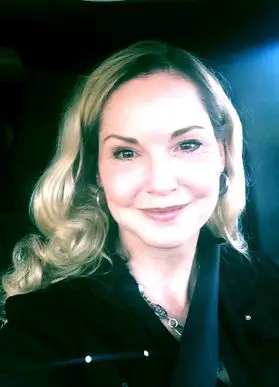Elizabeth Fisher
Alumni Stories
Elizabeth has enjoyed her journey since graduating from Meridian, describing it as successful, rewarding, and aligned with what she feels she is meant to do. She has been in private practice since 2011.
Prior to Meridian, she already had a master’s in psychology and was working towards completing her internship for an LMFT license.
Because Elizabeth had a history as a performing artist with a degree in theater for 20 years, she felt Meridian’s participatory nature and focus on self-expression and ritual aligned with what she felt was healing for her and how she wanted to work with others. After finishing her master's programs and working at a rehab clinic for methamphetamine addicts trying to keep their kids from being taken by the state, she entered Meridian’s PhD program.
Elizabeth had worked in the legal system with many domestic violence, parenting, and addiction issues. She did not expect to do so much work in domestic violence but ended up publishing her dissertation on the subject.
While in court testifying on behalf of clients, Elizabeth drew on Meridian’s practices and the ritualization she learned.
”I felt like with my education helped ground me in a set of practices and philosophy that helped me stay in alignment while working in a very contentious space…I even ended up supervising the whole mental health department and would lead them through the rituals that we did at Meridian. It helped ground all of us and keep us sane. In fact, there was so much going on like a lot of trauma, and I was able to keep myself, my clients, and also my colleagues in a space that felt held and nurtured and protected based on what I learned at Meridian. I would not have been able to do that if I hadn’t had Meridian’s help with that.”
Elizabeth went into private practice and shared: “One of the things my clients tell me is that I bring a lot to the table that they've never had in therapy before.”
She does sand tray exercises, role play, and imaginal transformative practice work with them.
“I felt like Meridian gave me a set of tools that is unique in the marketplace, and also gave me the ability to work with my own stuff that comes up in session as it does in ways that has been transformative not only for me, but for my clients.”
Elizabeth has focused on attachment-focused family therapy. She does a lot of trauma-focused attachment work with adults and works on attachment relationships between couples, parent-child, siblings, and estranged family members.
For a while, Elizabeth worked with people with more severe mental illness but now works primarily with depression, anxiety, bipolar, and PTSD, with most of her clients all over the map regarding political and spiritual views.
“I feel like Meridian gave me a lot of internal resources to work with a big diversity of clients.”

In her classes, students performed expressive work and were given opportunities to learn about interpersonal neurobiology and how the autonomic nervous system works. As she puts this into language for her clients so they can understand why they are doing some of these things, they are convinced and find themselves doing transformative work.
She says her training helped her understand transformative work in such a way that she can give that experience to others.
Since Oregon legalized Psilocybin facilitation, Elizabeth is also taking a class to become a licensed Psilocybin facilitator in addition to doing therapy.
“Magic mushrooms and the psychedelic industry is a really burgeoning industry right now and I am very much in alignment with Indigenous perspectives on plant medicine, so I’m looking to add that to the box of tools that I have to offer to my clients. I’m also in the process of founding the Oregon Psilocybin Industry Association, which is a web of professionals from the industry, and organizing a conference for them.”

Elizabeth is working to keep the administration of plant medicine in a therapeutic context in alignment with Indigenous practices. She feels that Meridian set her up well for that because she did a lot of ritualization in therapeutic work, in class at Meridian, and ritual is part of the Indigenous way of practicing. There are preparatory sessions for people prior to administering the medicine, which is delivered in ritual form. Following that, there are integration sessions, where you can process what occured after the medicine was administered. As the state moves toward having legally licensed sites, she will be using ritual in those contexts with people as they take the plant medicine.
Although Native American culture is close to her heart, her genetic lineage is heavily based in the North British Isles, so she resonates with the Druid culture and religion. Even though there was no written documentation, many anthropologists and medical anthropologists believe they used plant medicine as well.
“I’m leaning towards bringing Druid practices into my work because that is an alignment with my own lineage. I also want to give homage to all of the other iIndigenous cultures that have kept that alive.”
Elizabeth used to write and produce plays but no longer has the time for theater as it s a very time-intensive profession. However, she still does playwrighting and is a practicing Druid. She does a lot of performance-type rituals in her worship practice. She is also looking at working with Portland’s playback theatre, where you tell the actors a story about yourself or something you want to work through, and they act it out for you. Playback theatre helps people process issues they may not be able to express and is something Elizabeth is looking to get involved in if she has enough time.
When she started Meridian, Elizabeth asked herself: “How did theatre and music and all the things I did growing up heal me, when I have family members who are committing suicide all over the place?”
Elizabeth has had mental illness in her family, so she wanted to understand how and why what she did worked for her and how she could help others. Since her son was diagnosed with bipolar disorder from a young age, part of the reason Elizabeth went into psychology from being a theatre was to understand how to help her son.
”What I can say is that partially through what I learned at Meridian and partially through the work [my son] has done, he has gone from multiple hospitalizations throughout the year from the age of 10 to 20, so many scary suicide attempts, and never having a writing class to now getting his PhD at Oxford. That’s the kind of work that’s possible when we apply the kind of work that I learned at Meridian. He will be writing his story, and we plan to do a lot of work together in that space about supporting families with bipolar.”
Elizabeth shared that she really appreciates the education she received, calling it "stellar.”
“The Oregon market right now for mental health is in crisis; there aren't enough providers, and nobody can get service. But even before that happened, I would have a waiting list that was two years long. It was really hard to get in to see me, and I attribute that really to the training that I received.
She describes classes at Meridian as being unlike any other class she has taken. She has been through a lot of educational programs and says that Meridian was unique in a really good way.
“It gave me a different way to look at things. I would say that [the mental health field] is a wonderful way to help others while also growing and expanding your own internal life, and it can be a very, very rewarding career. It can be very financially secure. I felt very blessed in that way in this career. The difference with Meridian is they force you to go into the places that therapists need to go in order to be good therapists. Many programs don't do that. So in Meridian, not only are you going to learn how to help others, you are going to help grow yourself in a way that makes you the vehicle for that help.”